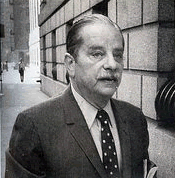Murray Irwin Gurfein (1907–1979), a distinguished lawyer and federal jurist, was best known for his ruling as a district court judge in the Pentagon Papers case, a clash between the government’s asserted national security interests and the New York Times’s First Amendment rights. This important ruling, which was upheld by the Supreme Court in New York Times Co. v. United States (1971), established a high bar against prior restraints even in the face of national security claims.
A native of New York City, Gurfein earned an undergraduate degree from Columbia College in 1926 and a law degree from Harvard in 1930. After serving as a law clerk to Judge Julian Mack of the Seventh Circuit Court of Appeals, he worked as an assistant U.S. attorney for the Southern District of New York for two years. He then worked in private practice before serving as deputy assistant district attorney for New York County. He served in the U.S. Army as a lieutenant colonel during World War II and, in 1945, assisted Supreme Court justice Robert Jackson at the Nuremberg trials before returning to private practice in New York City.
Gurfein denied a preliminary injunction in the Pentagon Papers case
In June 1971, a month after Gurfein was confirmed as a federal district court judge, the New York Times began printing what became known as the Pentagon Papers, a set of secret documents about the government’s involvement in Vietnam. On June 15 Gurfein granted a temporary restraining order halting publication, but on June 19 he denied the government’s request for a preliminary injunction. He wrote in oft-cited language: “The security of the Nation is not at the ramparts alone. Security also lies in the value of our free institutions. A cantankerous press, an obstinate press, a ubiquitous press must be suffered by those in authority in order to preserve the even greater values of freedom of expression and the right of the people to know.”
Despite the ruling, President Richard M. Nixon nominated Gurfein to the Second Circuit Court of Appeals in 1974. The Senate confirmed him, and he served as a judge in this court until his death.
David L. Hudson, Jr. is a law professor at Belmont who publishes widely on First Amendment topics. He is the author of a 12-lecture audio course on the First Amendment entitled Freedom of Speech: Understanding the First Amendment (Now You Know Media, 2018). He also is the author of many First Amendment books, including The First Amendment: Freedom of Speech (Thomson Reuters, 2012) and Freedom of Speech: Documents Decoded (ABC-CLIO, 2017). This article was originally published in 2009.

